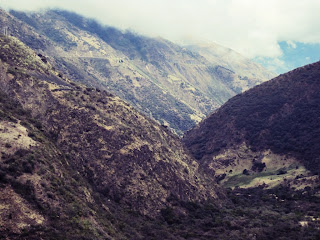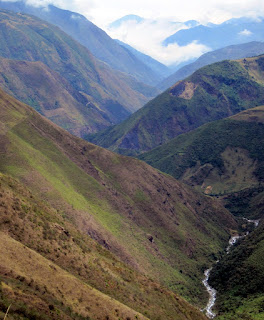It was early morning in Ibarra, Ecuador, and all the bars were closed
except for a small, one-room tavern at the edge of the old city. It
stayed open for men who were committed to their drinking. The police did not
bother with it so long as the drinking was done quietly. At a wooden
table inside, I was sharing liter bottles of beer with an out-of-work
carpenter, a belly dancer, one very drunken photographer, and the Black
Poet of Ibarra.
The belly dancer had just finished her performance and returned to the table. She wore a green
sheer dress and a sparkling bikini top, and she jingled when she moved.
Four old men at the other table looked at her longingly. She smiled and
was not ashamed of her bad teeth. She very much enjoyed the attention.
The Black Poet stood and announced that his poem for me was now complete.
He asked that the pasillo music be turned off. From the
pocket of his corduroy jacket, the Black Poet produced a jagged piece of convex
glass. It looked as though it had been broken from the bottom of a
bottle. He held the glass to his eye and he began to read the poem
he had written on both sides of a small square of paper:
– PETER –
Undiscovered friend, pollen of light,
Dragonfly that heeds the pollen of the setting sun,
Torch of wind inflamed,
You noble rebel of thought
Your heart is a tear of rain
That no one can undermine to fail
Dragonfly that heeds the pollen of the setting sun,
Torch of wind inflamed,
You noble rebel of thought
Your heart is a tear of rain
That no one can undermine to fail
Your thought is perfect, but cold
Like a game of death
On the outspoken lips of life
You love not philosophy,
But love instead the sad and cloudy mirror
Of the fool’s heart
Like a game of death
On the outspoken lips of life
You love not philosophy,
But love instead the sad and cloudy mirror
Of the fool’s heart
Go and fill your pockets with wind
And having no longer the ugliness of words
All shall be yours
The perfect, impressible beauty of the heavens.
And having no longer the ugliness of words
All shall be yours
The perfect, impressible beauty of the heavens.
The photographer had his head on the table and was asleep. The belly
dancer put her hand on my thigh. Your poem was beautiful, she said. Take
her upstairs if you want, said the carpenter. The Black Poet handed me
the square of paper. The poem was written in a shaky but elegant script.
The poem is now yours, he said. Please, will you do me the favor of walking me home?
The Black Poet was old and very sad. His wife of 48 years had just
died. He walked slowly and talked to me of Augustine and Nietzsche and
the Pre-Socratics. He talked of how life might have been had not men
become so reasonable, had not the myths been rejected and the gods
exiled. I told him that his verse about having pockets filled with wind
was going to stay with me a long time. The Black Poet lived nearby and I slept a few hours on his couch until the sun came up.
























































